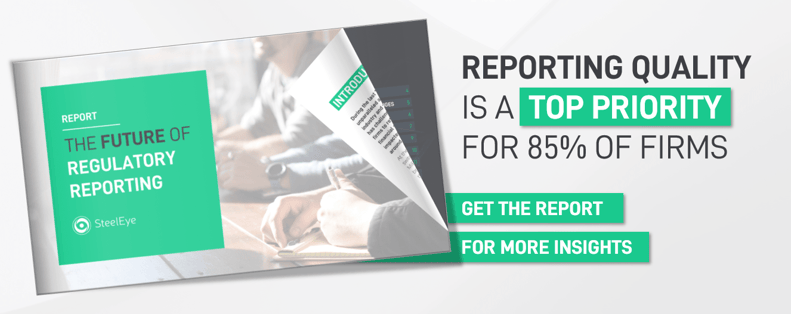Even though MiFID II came into force nearly four years ago, MiFIR Reporting continues to be an error prone and manual regulatory process for many financial firms. But as regulators increase their enforcement action and the reporting landscape grows in complexity, this must change. Firms need to prioritise their MiFIR Reporting accuracy to get ahead of regulatory change and to avoid regulatory scrutiny, sanctions and fines.
mifir reporting challenges
MiFID II is one of the most comprehensive pieces of financial legislation and brings with it a lot of complexity. MiFID II transaction reporting has been particularly challenging for firms due to the breadth of instruments in scope, the complexity around reportability of instruments, and the types of activity that constitute a reportable transaction.

This is one of the reasons there has been a high MiFIR reporting error rate thus far. On top of this, the events of the last 18-months have added complexity to MiFIR reporting as Covid and a wave of regulatory changes have challenged compliance teams.
The UK’s exit from the European Union introduced a range of changes, with more expected in the future – requiring compliance teams to keep abreast with any new information to ensure they understand and can implement any rules updates across their MiFIR Reporting processes.
On top of this, there are still many question marks around how much the UK will diverge from European rules, with worries that different rulesets between the UK and EU will add even more complexity. And this is all happening at a time when regulators around the globe are getting better at monitoring the vast volumes of data they collect - through Supervisory Technology (or SupTech).
 The Monetary Authority of Singapore (MAS) has been leading the way in this space and today has a fully automated platform where it can manage and consolidate all reporting activity from its regulated institutions. In the UK, we are seeing a similar trend as the FCA really starts to use MiFIR reporting data to monitor for financial crime and market abuse.
The Monetary Authority of Singapore (MAS) has been leading the way in this space and today has a fully automated platform where it can manage and consolidate all reporting activity from its regulated institutions. In the UK, we are seeing a similar trend as the FCA really starts to use MiFIR reporting data to monitor for financial crime and market abuse.
As a result, MiFIR Reporting accuracy is becoming more heavily scrutinised – putting heightened pressure on financial firms to address MiFIR Reporting errors.
How to get MiFIR reporting right
To improve MiFIR reporting accuracy the most important thing is for firms to focus on the improving the management of the underlying data. A lot of MiFIR Reporting solutions today are built for “perfect” data, and don't look at whether the data is a) what is required or b) has been correctly ingested. This is problematic because while the reporting processes may operationally run smoothly, the outcome will always be inaccurate unless the underlying data has been properly managed and validated.

Firms need to make sure that their data is correct and that nothing is missing. They also need to put in place feedback loops at various stages of the MiFIR Reporting workflow to identify data and/or process errors which could lead to incorrect reporting.
A reporting approach based on a single data strategy is a key ingredient to effective and future-proofed compliance. Bringing together data on a single platform creates a strong foundation for efficient MiFIR Reporting, but crucially also makes it easier to ensure that reporting data is accurate and complete.
The reality is that firms need to move away from manual processes and patchwork solutions. Focussing on accurately capturing, mapping, and storing data is the first step to increase MiFIR Reporting accuracy and completeness. The good news is that according to a recent poll we ran, 85% of firms listed reporting quality is a top priority for the next 12-months, so things are moving in the right direction.
For more insights on regulatory MiFIR Reporting, download our recent report on the Future of Regulatory Reporting here.



 The Monetary Authority of Singapore (MAS) has been leading the way in this space and today has a fully automated platform where it can manage and consolidate all reporting activity from its regulated institutions. In the UK, we are seeing a similar trend as the FCA really starts to use MiFIR reporting data to monitor for financial crime and market abuse.
The Monetary Authority of Singapore (MAS) has been leading the way in this space and today has a fully automated platform where it can manage and consolidate all reporting activity from its regulated institutions. In the UK, we are seeing a similar trend as the FCA really starts to use MiFIR reporting data to monitor for financial crime and market abuse.








